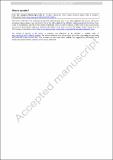What is morality?
Author(s)
Setiya, Kieran
Download11098_2021_1689_ReferencePDF.pdf (484.4Kb)
Open Access Policy
Open Access Policy
Creative Commons Attribution-Noncommercial-Share Alike
Terms of use
Metadata
Show full item recordAbstract
Abstract
In “Modern Moral Philosophy,” Anscombe argued that the moral vocabulary does not correspond to any concept in Aristotelian ethics, that it derives from a confused response to the ethics of divine command, and that it is literally meaningless. This essay contends that Anscombe was wrong. Morality corresponds to Aristotle’s general sense of “justice,” which is complete virtue in relation to others. But Anscombe’s question remains: what is it for an action to be morally wrong, not merely something one should not do? The answer is not that wrongness warrants blame or that an action is wrong when it wrongs another person, but that an action is morally wrong when it is something one should not do that one has no right to do. In the absence of rights, Anscombe’s question has no answer.
Date issued
2021-07-03Department
Massachusetts Institute of Technology. Department of Linguistics and PhilosophyPublisher
Springer Netherlands
Citation
Setiya, Kieran. 2021. "What is morality?."
Version: Author's final manuscript